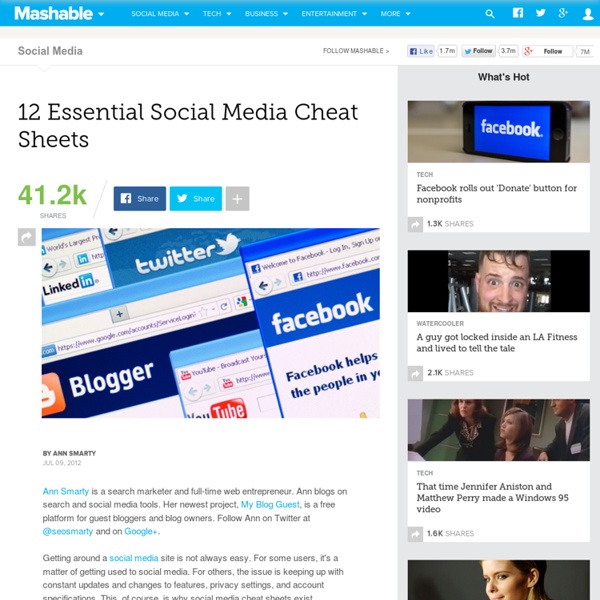Here's What Social Networks Know About You
A read through most online privacy policies is enough to make your stomach acid curdle. And social media companies have more access to personal data than most. Some collect information you expressly give them, like your credit card and telephone numbers. Others gather data based on how and where you use their services.
6 Successful Twitter Hashtag Campaigns
The Digital Marketing Series is supported by HubSpot, an inbound marketing software company based in Cambridge, MA, that makes a full platform of marketing software, including better B2B lead nurturing. Chances are if you've heard of a Twitter hashtag campaign, it's because it failed. The marketing world, in fact, is littered with the recent detritus of woebegone hashtag campaigns. Think back to McDonald's doomed #McDStories campaign or RIM's #BeBold effort, and it seems that trying to create a stir on Twitter is a fool's errand. Focusing on such misfires, however, conceals the fact that some — or even most — hashtag campaigns are actually successful. Below are six campaigns that effectively harnessed Twitter in a way that provoked positive discussion and action.
Secrets to Leveraging the New Facebook for WordPress Plugin
All of us want to go social and reach the right people to promote our business, right? Here’s the master key to turning your WordPress website into a social platform; well more or less. It all depends on how social you want to be. The Facebook plugin version 1.0 was launched a few weeks ago and it’s all yours to explore.
Social Media Reference Link
Social Media Reference Link / curated by @JuliusDesign Facebook Logo & Brand Guidelines
Social media is more than simply a marketing tool for academic research
According to Jeff Jarvis, author of Public Parts: How Sharing in the Digital Age Improves the Way We Work and Live, thanks to the internet, "we all have our Gutenberg presses and the privileges they accord." For academic institutions, the internet is a largely untapped resource for shaping and sharing scholarly research. As with the Gutenberg press, maybe professors are worried about permanently penning their ideas into cyberspace. Others may worry about privacy, especially regarding social networking.
Meta Tags vs. Keywords: Your Site's Visibility - Invisible Gold - Your Website Should Be Easy To Edit
META tags were originally used in the <HEAD> tag of an HTML document to help search engines find your site. Within a META tag, you can define two variables: description and keywords. The description is used to describe the content of your website while keywords are a list of terms, separated by commas that highlight important information in your page. For instance, if you were to create a website using these META tags, they might look like this: META tags are not displayed to individuals surfing the web and are used by very few search engines as a sole means of ranking web pages. In the past, using META keywords would help search engines find your site easier and list it on their results page according to its visibility.
How To Deal With Individuals Who Threaten a Social Media Attack On Your Brand
Yesterday morning (Monday) I received this email in my inbox from an individual who had written me on Friday: Although this snarky email was apparently meant as a (unnecessary) joke (and followed by an even ruder email), it got me thinking about the threat of a social media attack: how they can be intimidating while opportunistic, and how companies and organizations should go about responding to such a situation. The threat of a social media attack The threat of a social media crisis, attack, or even just negative publicity, can be quite intimidating. Especially when you’re aware of what can happen: reputational damage, loss of control, negative virality, a negative impact on your bottom line and everything in between. Plus, if you’re a regular reader of my blog, then you’re even more aware of the repercussions and possibilities that a social media crisis or attack can have!
Using social media to boost student employability
Universities have a responsibility to equip students to navigate around these channels which are used by employers in the recruitment process. Photograph: Dan Kitwood/Getty Images Social media is changing the parameters of how people and organisations interact and operate. Students need to know how to use it not just for jobs, but also to shape their online presence and convey the skills they have with ease.
Social Data: The New Driver for Marketing Strategy
There is a new generation of consumer data: social data. Social data is anything and everything collected from social network profiles and behaviors i.e. sharing activity, gender, interests, birthday, etc… And since social media is here to stay, accessing this information has never been more important. In fact, 97% of marketers surveyed by Wildfire believe that social media is an integral part of their business model and marketing strategy. However, what most companies don’t realize is that they can tap into the vast amount of data contained in the online social footprints that consumers leave behind. Utilizing this data to maximize marketing output and increase ROI is called Social Data Strategy. The following diagram illustrates the role that social data plays in the marketing strategy process.



